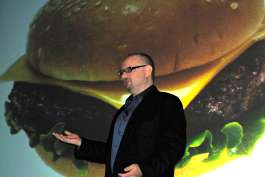 Jamais Cascio and a carbon-spewing cheeseburger.Ever wonder what the carbon footprint of a cheeseburger is? According to Jamais Cascio, Research Affiliate with The Institute for the Future, it’s 4-6 kg of CO2 equivalent per burger -- or 150 million tonnes per year in the United States, given that we eat an average of 100 cheeseburgers per person per year. (I'm sure the Bay Area brought the national average of burgers consumed way down. Thank you Alice Waters!)
Jamais Cascio and a carbon-spewing cheeseburger.Ever wonder what the carbon footprint of a cheeseburger is? According to Jamais Cascio, Research Affiliate with The Institute for the Future, it’s 4-6 kg of CO2 equivalent per burger -- or 150 million tonnes per year in the United States, given that we eat an average of 100 cheeseburgers per person per year. (I'm sure the Bay Area brought the national average of burgers consumed way down. Thank you Alice Waters!)
Cascio recently spoke about cheeseburger emissions and other unintended consequences of our lifestyles, in a plenary address at the Summer Study of the American Council for an Energy Efficient Economy (ACEEE), which took place at Asilomar State Park, Pacific Grove, California, August 17–22. He also discussed 250-mpg hybrid cars, cool roofs, walkable cities, and urban auto congestion charges.
Cheeseburger emissions include that from fuel used to transport beef to market, food that fed the cows that gave the meat and the milk to make the cheese, as well as… cow farts, a significant source of methane, a serious greenhouse gas.
The more I examine our lifestyle, the more I find that it has an impact on the environment equal to, if not greater than, that of our technology. The most energy efficient homes can be operated in a way that makes them energy hogs -- turning thermostats way up in the winter and way down in the summer. A myriad of electronic devices, all sucking energy in standby mode, will overcome the best of design intentions. When architects add square yard upon square yard of glazing to new buildings, even ones designed to be efficient and sustainable and to the highest of green building standards, energy efficiency suffers. Even the very best insulating window assemblies deliver at most an R-5 insulation rating, equivalent to about an inch and a half of fiberglass batt insulation.
Because behavior influences energy use so profoundly, the scientists at ACEEE recently hired Karen Ehrhardt-Martinez, a sociologist, as a Research Associate. To give you a hint at the kind of research Ehrhardt-Martinez will be doing, here is the title of a recent paper she published in Dialogue: "Energy Efficiency and Socially Rational Behaviors: The Role of Social Sciences in Bridging the Energy-Efficiency Gap and Accelerating Efficiency Gains."
